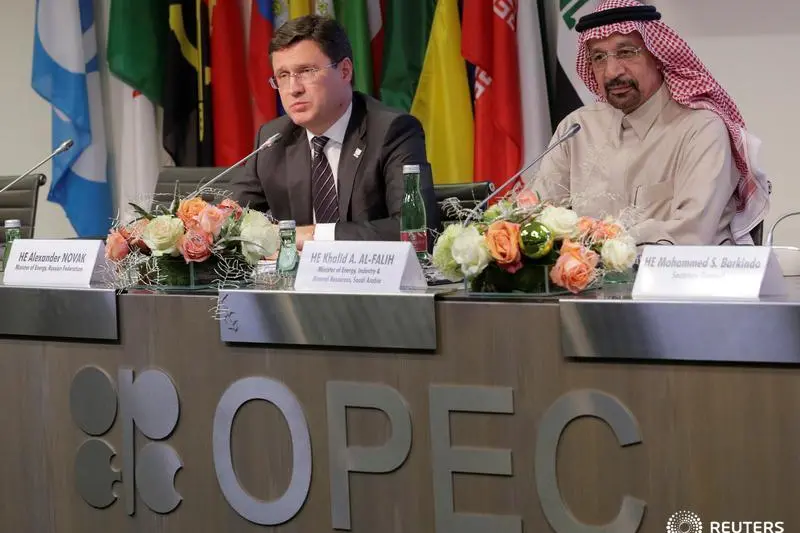PHOTO
Oil prices edged up on Friday, stabilising after an earlier slide driven by United States President Donald Trump's allegation that OPEC was artificially inflating global oil prices.
Brent crude oil futures gained 28 cents, or 0.4 percent, to settle at $74.06 per barrel. West Texas Intermediate crude futures for delivery in June, the most active U.S. contract, were up 7 cents at $68.40. The May WTI contract, which expired on Friday, gained 9 cents, or 0.1 percent, to settle at $68.38.
"Looks like OPEC is at it again," Trump tweeted. "With record amounts of Oil all over the place, including the fully loaded ships at sea, Oil prices are artificially Very High! No good and will not be accepted!"
Since early 2017, the Organization of the Petroleum Exporting Countries and its allies have curbed output in the hopes of eliminating a global oil glut.
Prices held up, even under Trump's comments, Walter Zimmerman, chief technical analyst at United-ICAP, told Reuters. "Oil looks like it wants to explore the upside a little more," Zimmerman added.
World stock markets dipped as worries about a global slowdown in smartphone demand dented the technology sector.
Weakness among tech stocks drove Wall Street equities lower for a second session, following a slide on Thursday by Apple Inc and its suppliers.
A strong earnings season could offset fears of slowing global growth and help stock markets recover from first-quarter volatility, which was fueled by a trade spat between the U.S. and China, and mounting geopolitical tensions over Syria.
“While fundamentals remain robust, geopolitics and trade war fears, concerns over slowing global growth, and idiosyncratic issues in the tech sector have all weighed,” Deutsche Bank strategists wrote in a note to clients, Reuters reported. They said a full-blown trade war between the U.S. and China was a major risk.
The Dow Jones Industrial Average fell 201.95 points, or 0.82 percent, to 24,462.94, the S&P 500 lost 22.99 points, or 0.85 percent, to 2,670.14 and the Nasdaq Composite dropped 91.93 points, or 1.27 percent, to 7,146.13.
The pan-European FTSEurofirst 300 index rose 0.05 percent and MSCI’s gauge of stocks across the globe shed 0.83 percent.
In the Middle East, Saudi Arabia's stock market surged on Thursday, bolstered by a pick-up in oil prices to their highest since late 2014, while a jump in heavyweight Qatar National Bank helped to lift Qatar's index.
The Saudi index finished in positive territory for a sixth straight day. Al Rajhi Bank rose 2.9 percent and Samba Financial Group 3.5 percent, while Saudi Arabian Mining Co (Ma'aden) advanced by 6.1 percent.
Saudi stocks have been gathering momentum in recent months as investors anticipate foreign fund inflows when the kingdom joins emerging market indices.
The Qatari index rose by 1.6 percent, driven by a 5.1 percent climb in QNB, after shareholders approved a previously-proposed increase of its non-Qatari ownership limit to 49 percent from 25 percent and a rise in the amount a single investor can own to 5 percent from 2 percent.
Abu Dhabi's index closed 0.5 percent higher. Dana Gas recovered from early losses to close flat. Shareholders have approved payment of a cash dividend for 2017, its first in several years. However, courts in Britain and the United Arab Emirates, ruling in the dispute over whether it must redeem $700 million of Islamic bonds, have given conflicting rulings on whether it can legally make the dividend payout.
Dubai's index finished 0.2 percent down as Dubai Islamic Bank fell 2 percent. The bank posted a 16 percent increase in first-quarter net profit on Wednesday, broadly in line with a forecast by SICO Bahrain.
Elsewhere, Kuwait edged down 0.1 percent, Oman rose 0.2 percent and Bahrain edged down 0.04 percent.
In Egypt, the blue-chip index rose 0.4 percent, with Commercial International Bank, the biggest lender, adding 0.7 percent.
In currencies, the U.S. dollar index rose to a two-week high against a basket of peer currencies, while sterling extended a decline in the wake of dovish comments from Bank of England Governor Mark Carney overnight.
The pound continued to fall against the dollar, hitting its lowest against the greenback since April 6. The dollar index rose 0.42 percent, with the euro down 0.47 percent to $1.2286.
Gold prices eased on Friday and as the dollar advanced on expectations of higher U.S. interest rates.
Spot gold lost 0.6 percent at $1,336.96 per ounce by 1:36 p.m. EDT (1736 GMT), while U.S. gold June futures settled down $10.50, or 0.8 percent, at $1,338.30.
In other news, Asma Dakkak, Research Manager at consultancy firm JLL, joined the Trading Middle East online forum on Thursday. When asked the general outlook for the real estate sector in Saudi Arabia and the UAE, she said: “Overall, I would say we are adjusting to a ‘new normal’ across the region.
“In the case of Dubai, for instance - we have noticed that the market has adjusted to more negative market conditions in Q1, and we are seeing developers focusing more and more on affordable options across the different segments.”
“I think Saudi Arabia is particularly interesting given all that’s happening. We are expecting the performance to remain soft this year, with potential recovery in 2019/2020,” she added.
For access to market moving insight, subscribe to the Trading Middle East newsletter by clicking here
Our Standards: The Thomson Reuters Trust Principles
Disclaimer: This article is provided for informational purposes only. The content does not provide tax, legal or investment advice or opinion regarding the suitability, value or profitability of any particular security, portfolio or investment strategy. Read our full disclaimer policy here.
© Trading Middle East 2018





















